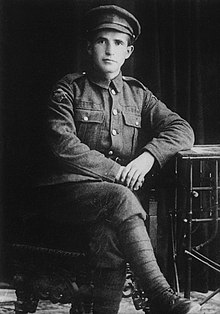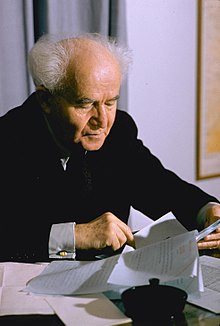David Ben-Gurion
David Ben-Gurion , Hebrew דָּוִד בֶּן-גּוּרִיּוֹן, Pronunciation [ daˈvɪd ben gurˈjo: n ] (born as David Grün on October 16, 1886 in Płońsk , then Congress Poland , Russian Empire ; died on December 1, 1973 in Ramat Gan , Israel ) called with the proclamation of the Israeli declaration of independence on 14. May 1948 from the modern state of Israel. He was its first prime minister .
In 1930, Ben-Gurion was one of the founders of the Zionist - Socialist Workers' Party of Israel (Mapai) in the then British Mandate Palestine , and headed it as party leader until 1963. After internal party conflicts - including against the background of the Lawon affair - he left the Mapai and founded the left-wing Rafi workers' list in 1965 . Both parties reunited in 1968 and merged with the Achdut haAwoda in the social democratic Avoda that has existed to the present day .
From 1948 to 1953 and from 1955 to 1963 Ben-Gurion was Prime Minister and Minister of Defense of Israel .
Early years
David Ben-Gurion was the son of Avigdor Grün, a lawyer who ran a Zionist organization. His mother Scheindel Grün died when David was eleven years old. While still in Poland he turned to Zionism and socialism . He immigrated from Poland to Palestine during the second Aliyah in 1906 and landed in Jaffa on September 7th . Here he participated in the development of the Jewish underground organization HaSchomer . He first worked in a company that grew oranges, then as a journalist. He took the name "Ben-Gurion" when he became a politician. Soon he was the leader of the Jewish labor movement .
The name "Ben-Gurion" means "son of the star" in Aramaic. He chose it in memory of Shimon bar Kokhba , Jewish leader during the Bar Kochba uprising in the 2nd century.
First World War and Political Activities

During the First World War, Ben-Gurion advocated the establishment of a Jewish battalion in the Ottoman army and the acceptance of Ottoman citizenship by the Jewish settlers, as he expected a victory for the Turks and benefited from this attitude for the realization of Jewish autonomy hoped for after the war. Because of his political activities, he was expelled from the Ottomans in 1915 and went to the United States . In 1918, Ben-Gurion joined the British Army's Jewish Legion .
After the end of the First World War, Ben-Gurion and his family returned to Palestine in 1918, which was under a British mandate from 1923 (until 1948). There he was first secretary and chairman of the 1920 founded union Histadrut . In addition, Ben-Gurion was the most important leader of the left Zionist party Achdut haAwoda ("Unity of Workers"), which had emerged in 1919 from the moderate wing of Poale Zion . He was also involved in building the Hagana , the military arm of Zionism in Palestine.
After his party Achdut HaAwoda had largely broken away from its Marxist roots by the end of the 1920s, it merged with HaPoel HaZair in 1930 to form the Workers' Party of Eretz Israel ( Mapai ). From its inception until 1963, Ben-Gurion was chairman of this party, which was always the leading force of the Zionist movement at that time. He was elected chairman of the Jewish Agency in 1935 . Ben-Gurion represented the Jewish establishment in Palestine and was known as a moderate politician. The British partially worked with him as a representative of the Hagana to arrest members of more radical militant groups.
He was involved in violent Zionist actions when his organization briefly cooperated with Menachem Begins Irgun . David Ben-Gurion to the executive of the Jewish Agency in June 1938 : “I am in favor of forced relocation (of the Palestinians); I don't see anything immoral in that. ” Although he helped prepare the bomb attack against the British Mandate Administration in the King David Hotel in 1946, he then contradicted the plan to no avail .
Israeli independence
On May 14, 1948, Ben-Gurion read the Israeli declaration of independence and led the new nation in the war of independence that followed . At the same time, Ben-Gurion tried to unite the various armed groups of the Zionist movement to form the Israeli army . In this phase, the sinking of the Altalena falls on his command, which had ammunition for the Irgun on board. This order is still controversial today.
On the other hand, in the Israeli declaration of independence he formulated a clear offer of peace to the Arab neighbors:
“We offer all our neighboring states and their peoples a hand to peace and good neighborliness and call for cooperation and mutual help with the independent Jewish people in their homeland. The State of Israel stands ready to do its part in a common effort for the advancement of the entire Middle East. "
On February 25, 1949, David Ben-Gurion was appointed the first Prime Minister of the State of Israel. He was to hold this office until 1954 and then again from 1955 to 1963. During his term of office numerous projects for the reclamation and development of the country as well as for the settlement of Jews from all over the world, especially from the Arab and Islamic countries, fell .
In 1953, Ben-Gurion announced his resignation from the government and moved to Kibbutz Sede Boker in Israel's Negev desert. Although he did not completely withdraw from politics, he stayed there until 1954. With the help of negotiations on (later actually carried out) German arms deliveries to Israel, Ben-Gurion sabotaged the peace negotiations led by Prime Minister Moshe Sharet with Egypt's President Nasser .
He returned to the head of state in 1955, initially as Minister of Defense - an office he had already held from 1948 to 1954 - but in the same year as Prime Minister. In this role he prepared the Suez War of 1956 in close cooperation with France and England . As a result of the Lawon affair , he resigned from the post of Prime Minister in 1963 and proposed Levi Eschkol as his successor. Two years later he fell out with Eshkol and the Mapai and founded the Rafi party with Moshe Dajan and Shimon Peres . After the Six Day War , in 1967 Ben-Gurion spoke out against annexing any further Arab lands. When Rafi merged with Mapai in 1968, he created the National List .
David Ben-Gurion retired from all political offices in 1970.
Private life

In 1915, in New York City , Ben-Gurion met Paula Munweis, who came from Russia. They married in 1917 and had three children. After Great Britain took control of Palestine from the defeated Ottoman Empire at the end of World War I, the family moved to Jerusalem. From 1931 until the 1950s, Ben-Gurion lived in his home in Tel Aviv. He returned to Sde Boker in 1970 , where he lived from 1953 to 1954. After his death in 1973, he was buried near the kibbutz next to his wife, who had died in 1968.
According to historians, Ben-Gurion had at least three known extramarital loves in Vienna, London, and New York. In 2015, an auction of handwritten love letters in Yiddish and Hebrew that Ben-Gurion had written to the Viennese medical student Regina “Rega” Klapholz in the early 1930s, who emigrated to Israel in the late 1930s and died in 2007, attracted media interest .
Honors
Ben-Gurion was voted one of the Most Important People of the 20th Century by Time Magazine . The international Ben Gurion Airport in Tel Aviv , located north of the city of Lod , and the Ben Gurion University of the Negev in Beersheba were named after David Ben-Gurion . The Ben-Gurion-Ring settlement in Frankfurt am Main is named after him. In the east of Nuremberg , part of the four-lane ring has been designated as the Ben-Gurion-Ring.
Quotes
“Like all other peoples, it is the natural right of the Jewish people to determine their own history under their own sovereignty. As a result, we, the members of the National Council, as representatives of the Jewish population and the Zionist organization, have met here today, on the last day of the British mandate over Palestine, and hereby proclaim our natural and historical right and based on the resolution of the General Assembly of the United Nations set up a Jewish state in the Land of Israel - the State of Israel. "
“If I were an Arab leader, I would never sign a treaty with Israel. It is normal; we took their land. It is true that we were promised by God, but how should she care? Our God is not their God. There were anti-Semites, the Nazis, Hitler, Auschwitz, but was it their fault? They only see one thing: we came and stole their land. Why should you accept that? "
"The God I don't believe in is a Jewish one."
"Whoever does not believe in miracles is not a realist."
“The death of six million victims places on us the greatest duty in our history not to let such a disaster happen again. We cannot raise our fathers and mothers, but our duty is to ensure that such calamities never happen again. "
literature
- Tom Segev : David Ben Gurion. A state at any price. From the Hebrew by Ruth Achlama . Siedler Verlag, Munich 2018, ISBN 978-3-8275-0020-5 .
In the movie
- Ben-Gurion, Epilogue , 2016. Documentary by Yariv Mozer
Web links
- Literature by and about David Ben-Gurion in the catalog of the German National Library
- David Ben Gurion (1886–1973) The Father of the State ( Memento September 8, 2008 in the Internet Archive ) on the website of the Jewish Agency for Israel
- Ben-Gurion on the cover of Time Magazine
- Newspaper article about David Ben-Gurion in the press kit of the 20th century of the ZBW - Leibniz Information Center for Economics .
Remarks
- ↑ Tom Segev : Once upon a time there was a Palestine , Munich ²2005, ISBN 3-570-55009-5 , p. 25
- ↑ Helmut Mejcher: The Arab East in the Twentieth Century . In: Ulrich Haarmann (Ed.): History of the Arab World , page 484.Beck, Munich 1994
- ↑ Ben-Gurion's love letters to mistress to be put up for auction. In: I24news of November 2, 2015 (English)
- ↑ To Rega, Rachel, Doris, Rivka - Oh, and Paula Too - Love, David Ben-Gurion , Haaretz , November 9, 2015
- ↑ http://www.time.com/time/time100/leaders/profile/bengurion.html Ben-Gurion
- ^ Quoted by Nahum Goldmann in Le Paradoxe Juif (The Jewish Paradox), p. 121.
- ↑ Doron Rabinovici: "I decide who is a Jew!" , NZZ Folio , January 2008
| personal data | |
|---|---|
| SURNAME | Ben-Gurion, David |
| ALTERNATIVE NAMES | Gruen, David |
| BRIEF DESCRIPTION | Israeli politician |
| DATE OF BIRTH | October 16, 1886 |
| PLACE OF BIRTH | Płońsk , Poland |
| DATE OF DEATH | 1st December 1973 |
| Place of death | Ramat Gan , Israel |



